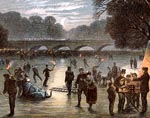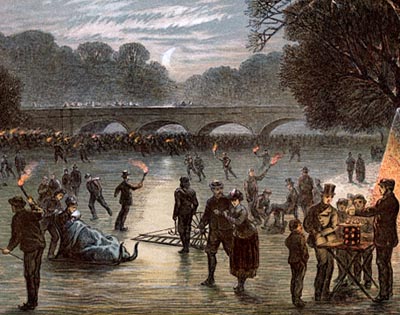Ice skating on water meadows: Hoping for a big freeze
Matthew Rice remembers ice skating on frozen water meadows, and hopes for another big freeze this year


Exquisite houses, the beauty of Nature, and how to get the most from your life, straight to your inbox.
You are now subscribed
Your newsletter sign-up was successful
Arms stylishly folded before him, the austere but graceful figure of the Rev Robert Walker slipping noiselessly across the loch in Raeburn's late-18th-century portrait is the definitive British skater. He's a long way from the stumbling gaggle of schoolgirls clustered noisily at the side of the ice rink or indeed the flocks who come to skid around the frozen courtyard of Somerset House in its winter plumage.
His outfit, refreshingly light on protective pads, helmets, and all in sombre black is that of a solitary spirit silently enjoying the changed state, half-fish half-bird but definitely not human, that all skaters share when they cut loose on the ice. Like Levin in Anna Karenina, who is revealed anew as a creature of noble grace when he takes to the ice, or the remarkable veteran skaters going out in whiskery tweeds and leather boots, skating produces a transformation from everyday to other-wordliness.
We travelled for years from house to house with a large leather trunk of old skates, the leather increasingly fissured and crackled, the blades finally abandoning their stainlessness and letting rust take over. But after 15 years, we lost faith-would it never freeze? When leaving that house, we consigned the skate case to a barn and left it neatly packed for the unsuspecting purchasers, who, perhaps even now, don't know the treasure they unknowingly bought.

A friend in Oxford, to where we were to move, assured us that stories of skating were urban legend, and that, in the 12 years she had been there, it had never occurred. We left the skates with a heavy heart, but needless to say, that very act sparked off a new decisiveness in whoever organises Britain's weather. Three winters on the trot of skating weather. All over the country, the broads, the fens, the Somerset levels froze solid. Most relevantly to us was Port Meadow on the edge of Oxford, that wild and atmospheric 500 acres of flat river plain that stretches along the Thames and partially floods in winter.
The shallow lake it provides is a remarkable winter haunt of wigeon, teal and shovellers, of godwits and the silver-flickering flocks of plover that swerve and turn themselves inside out as they swoop around the marsh in the morning. In these stretches of hard weather, it is in the inland parts of the country, lacking the mollifying effects of the sea, that the really cold temperatures are achieved. Last year, RAF Benson recorded -14˚ and similar temperatures were reached in the old winters of 1947, 1963 and 1981.
The transforming effects of the freeze are powerful. All changes to familiar places have similar effects; most obviously, snowfall, the climatic wedding dress that transforms the most lumpen girl into a blushing bride, can make Narnia of an industrial wasteland. The same happens less dramatically in the garden by moonlight, the river in heavy mist, even the daily light show of dawn and dusk. But freezing is particularly special, as the actual structure of the place changes from liquid to solid. What was inaccessible is now easily reached and, as with all these transformations, our moods are changed for as long as it lasts.
There is a party atmosphere that surrounds thefrozen lake. Perhaps we're reminded of those far from apocryphal years in Eng-land's mini-Ice Age in the 16th and 17th centuries, when the Thames froze in London and the city was en fête on its then major thoroughfare. The muddiest puddle when frozen is every small boy's delight, for either the crackling snap of the thin ice or the dull hair fissures in the solid block.
Exquisite houses, the beauty of Nature, and how to get the most from your life, straight to your inbox.
The evolution of the skating day is its own story. Two or three days pass without any question of the freeze promising results, but on the fourth day, the possibility emerges. A still night with plummeting temperatures is desirable. Too much wind and the ripples can become fossilised into the congealing water, providing a less than glassy surface. Like the Red Army in St Petersburg waiting for ice thick enough to bear a sledge, then a lorry and, finally, and most welcome of all, a sheet so deep and strong that a force of relieving tanks could trundle to the rescue, we wait with bated breath for the all-important 3in that signals skating can begin.
The planning must be immediate, as that 24 hours may be all there will be before our treacherous island climate bats a doleful warm front across the country, spoiling the fun. Thus, the full use of this new free facility of inestimable value must be exercised. There's family ice hockey, with pucks, skates and sticks dusted off and squeals of delight as a goal whisks past Father in wellingtons on the edge of the ice. Or skating by moonlight (surely the best of all) or skating at dusk while the bonfires glow around the edge of the lake, promising sausages and other treats for those who leave the ice or those, like me, for whom the ringside seat now offers quite enough excitement.
Then, there is the epilogue. Those first ripping cracks, indications that the end is nigh and the party over. Shrieking departure perhaps accompanied by depressingly soft rain destroying the ice from above. Friends in Norfolk abandoning the much-used broad as the thaw began fled with such haste that the pram containing their youngest daughter remained stranded and alone. So the husband was firmly sent across the cracking broad to rescue the carriage. Extraordinarily quickly, the ice goes and everyday normality returns, the magic melted with the ice.
Will this be a skating winter? I hope so; it seems to be a silver lining to global warming. All the old maxims of heavy crops of hawthorns meaning hard winters seem old hat now. I watched the flocks of fieldfares stripping bushes in Russia in early October that will now have fled the cold fronts and be heading for Scotland, then on to the rest of the country, perhaps even to Oxford. Back on Port Meadow, we want to see fearless men towing toboggans of squealing children across the ice or the effortlessly stylish former Olympic skater disappearing into the dusk alone in her element. I will make the fire and cook the sausages waiting for them to come back.
* Give Country Life for Christmas and save up to 40%
Country Life is unlike any other magazine: the only glossy weekly on the newsstand and the only magazine that has been guest-edited by His Majesty The King not once, but twice. It is a celebration of modern rural life and all its diverse joys and pleasures — that was first published in Queen Victoria's Diamond Jubilee year. Our eclectic mixture of witty and informative content — from the most up-to-date property news and commentary and a coveted glimpse inside some of the UK's best houses and gardens, to gardening, the arts and interior design, written by experts in their field — still cannot be found in print or online, anywhere else.
